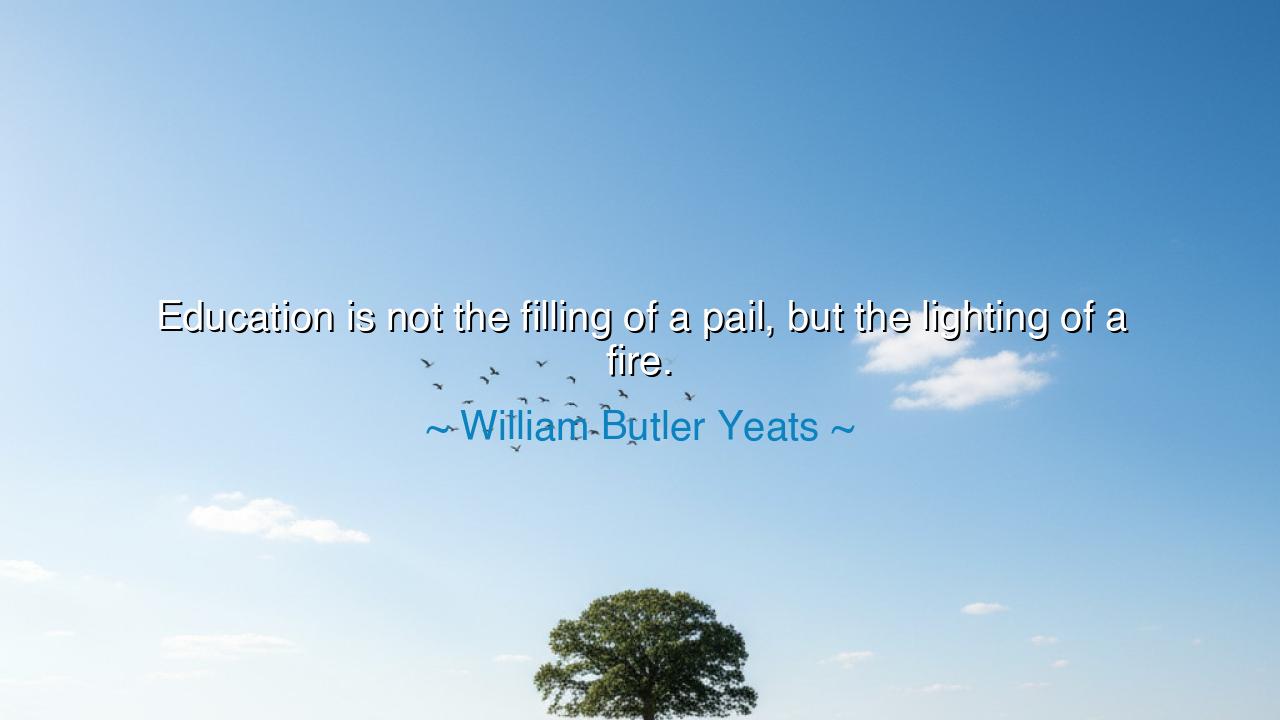
Education is not the filling of a pail, but the lighting of a






“Education is not the filling of a pail, but the lighting of a fire.” – William Butler Yeats
Listen, O seeker of wisdom, and let these words of Yeats, the poet-sage of Ireland, awaken your spirit. He spoke not as a scholar counting facts, but as a visionary who saw that true education is a living flame, not a lifeless vessel. When he said, “Education is not the filling of a pail, but the lighting of a fire,” he drew a line between two kinds of learning—the hollow gathering of knowledge, and the sacred kindling of the soul. For what use is it to fill the mind if the heart remains cold? What good is knowledge if it does not burn with wonder, purpose, and truth?
In every age there are those who mistake education for accumulation. They pour information into the mind as one might pour water into a bucket, thinking that fullness is the same as enlightenment. But the wise know that such learning soon grows stagnant, for water that sits still begins to rot. The true teacher does not fill; he ignites. He does not say, “Remember this,” but rather, “Question, imagine, seek.” For knowledge imposed from without may fade, but knowledge awakened from within endures forever.
This truth shines across history. Consider Socrates, the gadfly of Athens, who claimed to know nothing, yet whose questions lit fires in the minds of all who heard him. He did not hand his students answers like coins, but struck sparks of thought through dialogue and doubt. His student Plato built a philosophy that has guided civilizations, yet all of it began from that sacred flame kindled by his master’s questions. Thus, even in death, Socrates’ fire burns still—proof that education, when born of passion and curiosity, is immortal.
So too, the tale of Maria Montessori, who taught children not by command but by wonder. She observed them, guided them, and let them explore until learning became joy, not labor. The light she lit in them spread across the world, transforming schools and minds alike. She understood, as Yeats did, that the child is not an empty vessel waiting to be filled, but a candle waiting to be lit. Once kindled, that light seeks its own path, illuminating all it touches.
Yeats himself lived in a world shadowed by political unrest and cultural decay, yet he saw in education the hope of renewal. He believed that the mind must be stirred to life, not stuffed with dry facts. For a filled pail grows heavy and still, but a fire grows brighter the more it burns. The educated soul is restless—not with dissatisfaction, but with the hunger to understand, to create, to improve. The fire that Yeats spoke of is the divine spark that drives humanity forward—the yearning for truth that no darkness can extinguish.
Therefore, let every teacher remember: your task is not to pour but to kindle. Do not teach to be obeyed; teach to awaken. Let your words be flint and steel upon the hearts of your students. Let them burn with curiosity, with wonder, with courage to think their own thoughts. And to every learner, remember: your duty is not to gather facts as trophies, but to keep your inner flame alive. Feed it with reading, reflection, and experience. Protect it from the winds of cynicism and despair.
For when your fire burns bright, you become not merely learned, but alive. You will see that wisdom is not a burden but a light that spreads. And when you share that light—through your work, your kindness, your courage—you become part of the eternal chain of teachers and seekers that spans the ages.
So remember always the words of Yeats: “Education is not the filling of a pail, but the lighting of a fire.” Let this be your creed. Seek not merely to know, but to ignite—in yourself and in others. For the flame of the human spirit, once awakened, can light the world.






AAdministratorAdministrator
Welcome, honored guests. Please leave a comment, we will respond soon